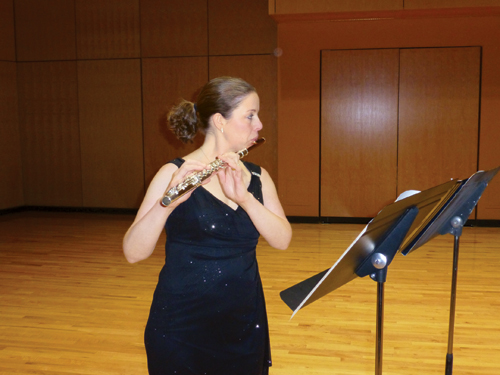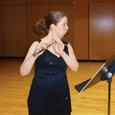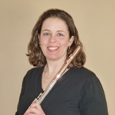
As good music educators, we have high hopes for our students. We hope that the day they graduate is not the last day they play their instruments. We dream that they will be music-makers for life. We picture them in community bands, playing for their own children someday, and for some, that they will have careers in music. We have read the studies that share all of the amazing benefits of making music and are ready to spout off reasons why someone should join band, but despite all of that, few music teachers still play the instrument that led them to a career in music in the first place.
When I was working on my doctorate at Ohio State, the director of the Wind Symphony, Russel Mikkelson, told us to keep playing our instruments while teaching so we can always remember how it is to be in the midst of making music and so we can maintain that common bond of musical understanding with our students. He was clear with us that we might fall from the heights we attained as college-level players, but it was nonetheless important that we keep playing. The further removed one becomes from the act of playing an instrument in an ensemble, the more difficult it will be to remember that feeling and to be able to use it to connect with the students.
Conducting and teaching are musical arts as well, but no music teacher’s goal is to give up playing an instrument upon entering the profession. In my work with music education majors, fear of having to replace their instruments and music with permission forms and rubrics is a common concern.
Teaching is pretty much a 24/7 job, but time can be found to stay active as a musician, be a good teacher, and have a social life. It will take the acceptance of certain realities and the commitment to a certain level of discipline and organization, but it is possible.
Realities
Certain realities must be faced. The number of hours in a day is not going to increase, so honesty about what can be accomplished in that time is essential. For example, I tell my students that maybe I could be a better flutist, but that would most likely come at the expense of my job or my marriage, neither of which I want to lose. I practiced four hours a day in graduate school, but I have to prepare for the classes I teach and want to spend time with my husband. Before setting out on a mission to get back to playing, we must realize that in most cases, we had more time to practice in college than we will have as a teacher. The good thing is that teachers are smarter about how to practice, so the time that is available for practice can be used more productively.
Most full-time teachers are unlikely to play in an ensemble that matches the level of their college groups. It is possible to perform with high-level ensembles at times, and some teachers are fortunate enough to live in an area where there is such an ensemble available, but few, if any, teachers have the time for a high-level wind ensemble that rehearses six hours a week and performs a concert every six weeks. This is all the more reason to relish the days of our college ensembles with a warm heart and appreciation for the teachers whose sacrifices and talent allowed us to have those experiences while we can look forward to providing opportunities for our students.
That said, there are ways to find time to play our instruments, and the good news is that with maturity, our general level of musicality is probably much higher. We have had more life experiences, felt more emotions, and heard more music, all of which can inspire a more musical performance, even if we miss a note here or there.
Snippets of Time
Take an honest look at your schedule. There may be just enough time for a couple tone studies in the morning when you get to school. Five minutes of a prep period can be devoted to playing a few scales, even if you are playing them on the student model flute you have lying on a table in your band room, before turning to other tasks. I prefer to have large chunks of time available for practice, but if it is the only time available, I’ll practice while the casserole for dinner is in the oven.
Double Duty
Look for opportunities to play during what you are already doing. For example, demonstrate styles on your instrument during rehearsals. Play for your students instead of using a recording, especially in general music. If you need a Baroque piece for a music appreciation class, play it live. Playing at church or a nursing home is another frequently overlooked opportunity.
Get Involved
Get involved in your instrument’s society or association and attend their conferences and conventions. These organizations are not just for professional performers and college teachers.
Find an Ensemble
Look for an ensemble that allows you to perform on a regular basis without taking too much time. For example, many communities have summer community bands that have minimal rehearsal commitments and from which you can come and go as your schedule allows. In my area, we have a wonderful summer band, the Musicians Concert Band, that is comprised almost solely of music teachers. We rehearse from 7-9 p.m. on a Wednesday evening and give a concert the next evening four times each summer. The ensemble is a wonderful chance for networking, socializing within the profession, and making music.
Make an Ensemble
Create a chamber ensemble with the teachers in your school or area. These are people you see often and whose schedules probably align with yours. Perform for your students to show them that you love playing.
Solo
Program a solo (or duet or trio) for you to play with your ensemble. Have a student or colleague conduct. This gives your students a chance to see you getting excited to perform, practicing, making mistakes, and being like them. Sometimes, teachers believe that this would be tooting their own horn or taking opportunities away from students, but in reality, there is a powerful lesson in showing students that you still love music and that they can be life-long musicians. You will be modeling skills for them and showing them that you can practice what you preach. Plus, using a guest conductor has all sorts of benefits. If you have a student conduct, he will learn conducting skills. If you have another director in your district conduct, you can strengthen the transitions between each level in school and help with recruiting. For example, if you teach middle school, and the high school director guest conducts while you perform, the students will learn that a different director is not so scary. If you teach high school and regularly have the middle school director guest conduct while you solo, the high school students will look forward to seeing their former teacher again.
Chamber Music
Program duos, trios, or quartets with your students and play along, maybe even as a planned member of one of the groups.
Have Realistic Expectations
If you can only carve out two 15-minute chunks of time to practice, distill your procedures down to the most effective exercises. Give yourself permission to escape routines. For example, instead of playing exercises on the weekend, I often only play music I enjoy and skip the exercises.
Mental Practice
For those who do not believe in mental practice, the following exercise will change your mind. Read the part in italics and then try it before reading further:
Close your eyes and picture a child up to bat at a little league game. Here comes the ball – he swings, and hits the ball.
Did you feel your arms sort of engage and your core muscles prepare as the bat struck the ball? You can benefit from mental practice. Think through difficult passages or even just scales while you are in a boring meeting, waiting for an appointment, or sitting at that little league game, waiting for your child to be up to bat.
Listen
Take time to listen to great performers on your instrument. While that may sound obvious, think about how you just sort of felt your body hit that baseball. When you watch someone perform (or at least hear them), your body will participate to some degree.
Being a musician is a wonderful thing. I often talk to people who wish they had learned to play an instrument. Think about the ways you felt the power of music in your life while performing and all of the special moments that happened because of the gift of music. There is no reason we have to relegate being a musician to only the scholarly realm or to save it for some magical day in the future when we will have time. The time to practice is now. Do not worry how well you play now compared to how you played in college. Life is passing by, so make music now. There is no time like the present.






